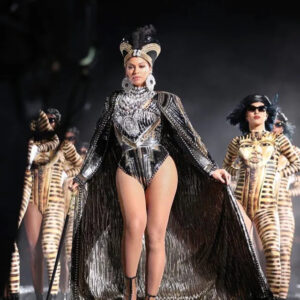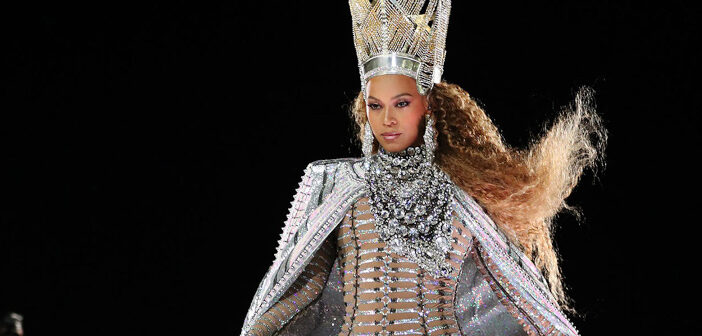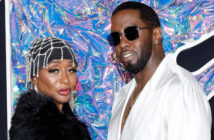Hip-hop music is playing next to sarcophagi and statues in a Dutch museum in an effort, according to the curators, to demonstrate how black musicians were influenced by ancient Egypt.
A video of Rihanna channelling Egyptian aesthetics is displayed next to an image of diva Beyoncé dressed as Queen Nefertiti from antiquity. 
What first appears to be a golden pharaoh’s mask is actually a contemporary sculpture based on the Nas album cover.
Egypt, meanwhile, is furious and has reportedly forbidden the museum’s archaeologists from participating in an excavation at a significant site because of the “Kemet” exhibition at Leiden’s Rijksmuseum van Oudheden (National Museum of Antiquities).
According to Dutch media, Egypt’s antiquities office accused the museum of “falsifying history” with its “Afrocentric” methodology, which aims to usurp Egyptian culture.
After the controversy in Egypt went viral, the museum claimed that it had been targeted by remarks that were “racist or offensive in nature” on social media.
READ ALSO:
Outrage In Egypt As Netflix Debuts Black Cleopatra
Egypt Bans Dutch Archaeology Team From Museum Over Afrocentric’ Exhibition
Therefore, what was meant to be a celebratory event of “Egypt in hip-hop, jazz, soul and funk” has turned into a cultural conflict.
Political geography expert and assistant professor at the University of Amsterdam who specialises in the Middle East and North Africa analyses the responses: “From what I can see, the government back in Egypt has sort of viewed it in a very particular light.”
According to Dr Ali Hamdan “I think it’s, it’s important for us to, as you say to kind of move away from this more Eurocentric perspective through which Egypt’s history has been viewed,”.
The exhibition examines current artworks, photography, and album covers from black musicians.
The ancient Egyptian impact on musicians like Tina Turner, Earth Wind & Fire, and Miles Davis is depicted on walls of album covers, and there is also a unique interactive multimedia piece.
Egyptian officials condemn any attempt to meld their historical tradition with American black culture.
The doctor explains, “It’s not only about kind of African Americans taking Egyptian culture, it’s about a very wealthy commercial project that is to say Hollywood and other kind of related industries doing that,”
“So the perception is that there are these wealthy Hollywood elites who are kind of taking advantage of Egyptian culture and kind of rewriting how they view their own identity right. So there are a lot of layers to this I think that are worth keeping in mind.”
The museums has insisted it aims to “show what scientific, Egyptological research can tell about ancient Egypt and Nubia.” As it also aims to works are presented “to show and understand the depiction of ancient Egypt and the messages in music by black artists.”
Egyptologist Daniel Soliman is the exhibition’s curator.
Wim Weijland, the director of the museum, was quoted as saying that Egypt’s response was “unseemly” by the Dutch newspaper NRC.
Daniel Voshart, an artist and filmmaker, went to the exhibition. He lauded its “informative overview” and asserted that the exhibition’s response had been exaggerated.
According to the 37,-year-old from Canada “This doesn’t make any sense to me and they’re just sort of being too sensitive or trying to score political points maybe… Nothing to me was shocking,”.
“There were music videos that were already made and it’s not like the Dutch government paid Beyoncé to become you know, Egyptian.”
“There are paintings of Egyptians with dark, dark skin, curly hair, I mean it’s if, if they’re trying sort of to distinguish themselves from other parts of Africa, maybe a bit too much, but it was a blending of cultures, a blending of people. I don’t think you know it’s theft anyway.”
Kemet, the ancient Egyptian name that meant “the black land” is the inspiration for the name of the Kemet exhibition.
Ali Hamdan, an assistant professor at the University of Amsterdam specialising in political geography, told AFP, “It’s not just a story about whether the museum is getting the Egyptian identity right or wrong,”.
“This is a story about two different projects to make sense of Ancient Egypt. One is a… cultural project by this museum, and another is a political project by the Egyptian state.”
Hamdan added that “your average Egyptian would describe themselves as Arab first maybe Egyptian second”, while their relationship with Africa was “complicated”.
READ: 7 Warning Signs You Are Magnesium Deficient




